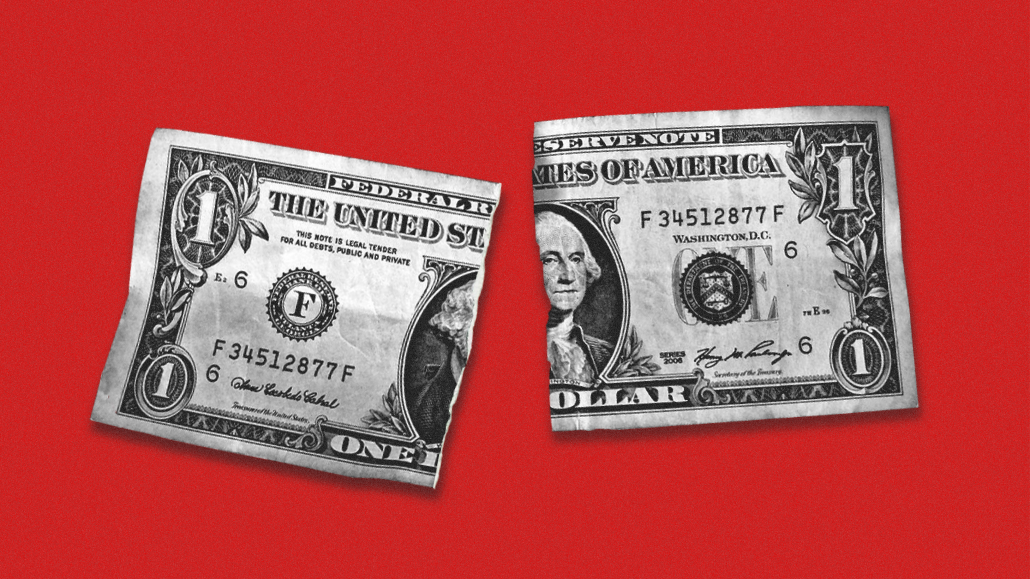Secure your place at the Digiday Media Buying Summit in Nashville, March 2-4
Horizon Media’s latest inflation report shows things are getting worse for consumers

Horizon Media’s WHY Group didn’t initially plan to put out a second study following its first, executed in fall 2022, which gauged the effect of inflation on people struggling right before last year’s holiday season.
But when economic conditions didn’t improve much — if at all — as 2023 started, it was clear a follow-up needed to happen, explained Maxine Gurevich, svp of cultural intelligence at Horizon Media. Even if, as the report noted that 2023 inflation rates have ebbed by 30% from their peak.
This second report, dubbed Inflation Nation, still revolves around three main categories of consumers: The resilient (those who are spending much the same as before inflation kicked in); the Anxious (those curbing their spending so as not to dig too much of a financial hole; and the Vulnerable (those barely scraping by paycheck to paycheck).
The goal of the report is to guide brands on how to market more effectively and thoughtfully given the sensitivities of the three cohorts.
Though one would expect the Vulnerable and the Anxious to yield the need for most adaptability among marketers, interestingly it’s the Resilient whose habits have changed the most since year one, said Gurevich.
“This year, the biggest kind of surprise to us was actually they are not as resilient as they were last year,” she said. “They’re dipping into their savings a little bit, and are starting to adjust their spending — not as much as the others. But we’re starting to see a shift in their purchase decisions.”
That said, only 43% of the Resilient are only “somewhat concerned” about inflation and care most about brands stepping in to resolve societal issues.
As for the Anxious, who the report cites as highly price sensitive, 59% are cutting costs by spending less on things they like to do (up from 55% in 2022) in part to preserve what they see as their dwindling nest egg. They are still spending, just not as much.
Perhaps the most disturbing realization the study uncovered is among the Vulnerable, who are closer than ever to exhausting their resources and savings and are borrowing just to secure essentials for living.
“Some people are also spending through ‘buy now pay later,’ particularly among the vulnerable,” added Gurevich. “Especially when it came, unfortunately, to household essentials and groceries. And that’s really where you start to see they are really struggling.”
So what are brands to do? The report suggests they be more transparent in their marketing about rising costs of their product or service — even though many of them don’t want to do that.
“Not a lot of companies want to hear that they need to be transparent around why they might be shrinking their packaging to save money,” added Gurevich. “Not only are people noticing [shrinkflation — when companies reduce package size but charge the same or more for it] now they’re actually talking about it and sharing it on social. That’s actually where we saw the biggest peak in social conversation — it was these themes was around the ‘unfluencer’.” (Unfluencers being influencers who guide consumers on what NOT to buy.)
Where is the economy going — up or down? From Brian Wieser’s point of view, there’s not been much change either way — which could be a good or a bad thing. The independent analyst has been more positive about economic conditions through the lens of media spending for a while. And as of now, “there’s been no meaningful change” in his outlook.
More in Marketing

Thrive Market’s Amina Pasha believes brands that focus on trust will win in an AI-first world
Amina Pasha, CMO at Thrive Market, believes building trust can help brands differentiate themselves.

Despite flight to fame, celeb talent isn’t as sure a bet as CMOs think
Brands are leaning more heavily on celebrity talent in advertising. Marketers see guaranteed wins in working with big names, but there are hidden risks.

With AI backlash building, marketers reconsider their approach
With AI hype giving way to skepticism, advertisers are reassessing how the technology fits into their workflows and brand positioning.








